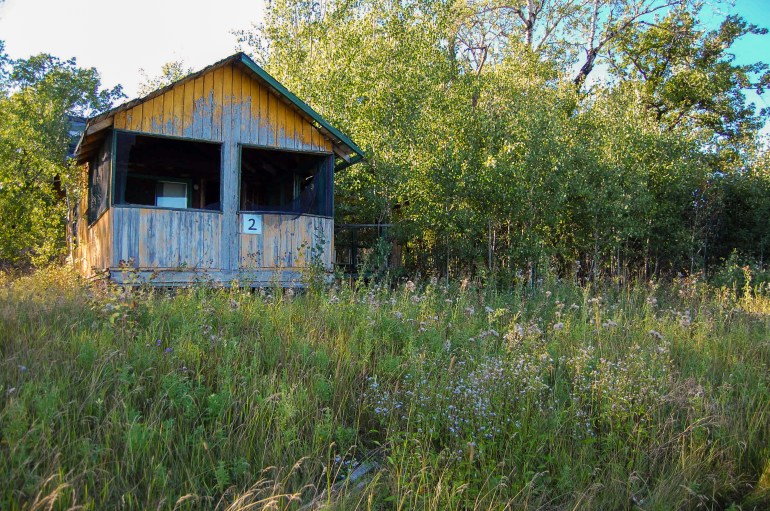On a windy afternoon, Mike Fobister expertly guides his motorboat across choppy waters in the direction of the wooden cabins that dot a rocky hillside on the other side of the lake.
His father, Joseph “JB” Fobister, 69, sits to his left. The pair chat quietly as the waves whizz by before Mike slowly brings the boat to a stop near the shore.
Many of the cabins have seen better days. Windows are broken or missing outright; roofs have caved in.
A dilapidated wooden boardwalk, overrun by tall grass and shrubs, leads up towards what was once the heart of this now-defunct tourist camp, known as Grassy Lodge.
For decades, the people of Grassy Narrows would come here to guide fishing tourists through the network of rivers.

Mike worked at Grassy Lodge as a river guide when he was a teenager in the 1990s, helping visitors reel in and clean their daily catch. Years earlier, his father did the same.
“As I get older, the memories have started to slowly fade,” 48-year-old Mike says from the shore, an old fish-cleaning shack standing in the distance behind him.
He remembers the camaraderie that he and the other fishing guides built in their time at the camp. Often, after the day’s work was finished, they would spend hours swimming in the lake.
“All the young guys would go across to the big cliffs over there … and jump off the top of that cliff,” Mike says, pointing to a crag jutting out across the water.
“It’s probably about 20ft [6 metres] up,” he says. “The older guys would tell us, ‘You guys are crazy,’ because they would see us on top of that cliff and see us jump off.”
Today, Mike and his father go out on the water whenever they can. So, too, does Mike’s teenage son.
The river system is expansive, and the water stretches out as far as the eye can see. Rocky cliffs and tall conifer trees line the shores.
“I think a lot of Grassy people, that’s where they get their healing from, is being out on the water,” Mike says. “There’s something. There’s something there that calls us out.”

But the ruins of Grassy Lodge and the nearby Ball Lake Lodge serve as a bittersweet testament to what was stolen from the community when its waters were poisoned.
Ball Lake Lodge was the larger employer of the two, giving dozens of people from the community jobs as guides, cleaners and maintenance staff.
It shut down abruptly when the poisoning was discovered in 1970, while Grassy Lodge continued to operate throughout the mercury crisis until tourists stopped coming and it fell into disrepair.
“It’s sad it had to turn out like this. It probably could have kept going,” JB says, his voice echoing in the large, empty, dust-covered room that once served as a communal lounge for tourists.
“We weren’t allowed to come in here when the guests were here,” JB recalls.
In the next room, the former kitchen, the sun shines through a gaping hole in the roof. Wine bottles, coffee mugs and cleaning products litter the counters and floors. Industrial cooking appliances sit haphazardly against one wall.
“Me and my brother used to maintain the yard here,” Mike says once he and his father are back outside, staring out over an overgrown lawn. “We’d come and do the grass. That’s a lot of grass.”
“Didn’t bother me,” JB interjects with a laugh. “I was getting paid. I’ll do it. It didn’t seem like work. [When] you’re [animal] trapping, you’re working hard. Pushing a lawnmower is like a piece of cake.”
